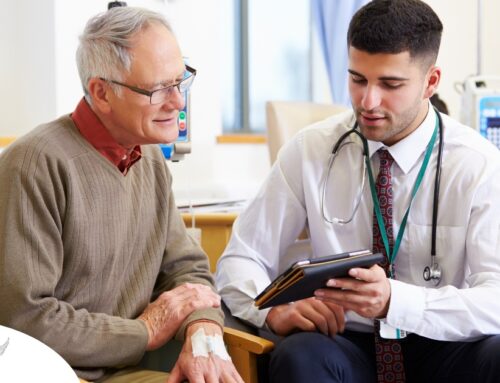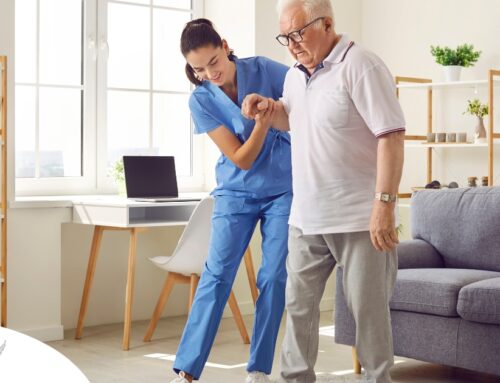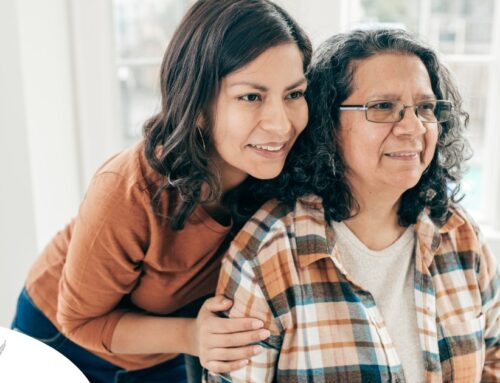As members in Philadelphia age, families must update their caregiving strategies to accommodate their loved ones’ changing needs. As a significant health concern, pneumonia in elderly adults can be notably dangerous, making it a priority for family caregivers everywhere to keep an eye out for. Understanding what pneumonia is, its symptoms, and how to craft an effective pneumonia management strategy helps ensure family caregivers can provide top-notch care and support during the recovery process.
Read on to learn more about pneumonia, its impact, and the role family caregivers play in helping elderly loved ones manage this potentially life-threatening illness.
What Is Pneumonia?
Pneumonia is a lung infection that may be caused by various pathogens, including bacteria (pneumococcal pneumonia) and viruses (viral pneumonia). In older adults, pneumonia can result from common illnesses like the flu or aspiration—when food, liquid, or saliva enters the lungs instead of the stomach. Having pneumonia can be notably severe in seniors because their respiratory systems and immune defenses are often compromised.
Once infected, pneumonia inflames the individual’s air sacs in one or both of their lungs, causing them to fill with fluid or pus. Common symptoms include a persistent cough, chest pain, fever, and difficulty breathing. Older adults can also exhibit confusion, delirium, or decreased energy. Because pneumonia symptoms in elderly adults often differ from those in younger individuals, cases sometimes get overlooked or misdiagnosed. For all these reasons, prompt medical attention is essential to distinguish pneumonia from other senior health issues.
How Is Pneumonia Treated?
Once diagnosed, doctors typically prescribe antibiotics for pneumococcal pneumonia infections, while viral pneumonia may require a combination of antiviral medications, steroids, and supportive care. Healthcare providers advise patients to rest, stay hydrated, and use over-the-counter pain relievers to manage fever and discomfort. In severe cases, hospitalization may be necessary for oxygen therapy and intravenous fluids.
Individuals with underlying health conditions or weakened immune systems may require more intensive medical attention. For all these reasons, patients must carefully follow their healthcare provider’s recommendations to ensure a full recovery.
Risk Factors for Pneumonia in Elderly Adults
Understanding risk factors predisposing seniors to pneumonia can help family caregivers be more cautious in identifying pneumonia’s warning signs. Pneumonia risk factors in the elderly include:
- Weakened Immune System: Aging and a decline in natural immunity often go hand in hand, making older adults more susceptible to infections, including pneumonia.
- Chronic Health Conditions: Preexisting respiratory conditions like COPD, heart disease, and asthma can increase the risk for pneumonia, as they impair lung function and overall health.
- Limited Mobility: Seniors with significant physical limitations or prolonged bed rest may have compromised respiratory function, making it easier for pneumonia to develop.
- Malnutrition: Being malnourished can negatively impact a senior’s natural immunity and respiratory health, leaving them more vulnerable to pneumonia.
- Cognitive Impairment: Dementia and other cognitive disorders may contribute to an increased risk, making it difficult for elderly individuals to fight off infections or follow medical advice.
Pneumonia Caregiving Essentials: Management Tips for Families in Philadelphia
For families caring for elderly loved ones with pneumonia at home, understanding how to support their needs and promote a full recovery is essential. Here’s what to include in your pneumonia management strategy:
Encourage Hydration
Staying hydrated is vital for anyone with pneumonia, notably the elderly. Follow a hydration schedule, encouraging your loved one to drink water and other fluids consistently throughout the day. Flavored beverages, herbal teas, or broths can help make hydration more appealing, increasing intake. Conversely, patients should avoid caffeinated drinks, as they can cause or exacerbate dehydration.
Medication Supervision
Medication compliance is another essential aspect of effective pneumonia management. Maintain a schedule for administering your loved one’s medications, using pill organizers or alarms as reminders. Monitor for side effects and ensure medications are taken as prescribed, including any over-the-counter products for pain and fever management.
Breathing Exercises
Breathing exercises can help speed up pneumonia recovery by improving lung capacity and promoting airflow. If prescribed by their doctor, encourage your loved one to do deep breathing exercises, such as taking slow, deep breaths, to improve lung function. Utilizing an incentive spirometer, a device that helps encourage deep breaths can also be beneficial.
Maintain a Clean Environment
Maintaining a sanitized living space will help promote a speedier pneumonia recovery, whether it’s your home or theirs. Establish a cleaning routine that includes disinfecting high-touch surfaces and frequently used areas, like kitchens and bathrooms. Furthermore, encouraging everyone in the house to wash their hands regularly will help minimize the risk of spreading pneumonia-causing germs.
Seek Follow-up Care
Vigilance is key when managing pneumonia and preventing complications. Family members should be aware of pneumonia warning signs, including high fever, chest pains, and breathing difficulties, and contact a healthcare provider promptly if any of those symptoms persist or worsen. In general, planning for emergencies can ensure timely assistance for elderly loved ones with pneumonia complications.
Professional Home Care: Enriching the Pneumonia Recovery Experience
When families need assistance, reputable home care providers can play a pivotal role in managing pneumonia for elderly loved ones. In-home caregivers support clients recovering from pneumonia in ways that include:
- Health Monitoring: Professional caregivers perform regular health assessments, tracking symptoms and changes that may require further intervention by a healthcare provider. They also routinely update families on their loved one’s condition, keeping them informed every step of the way.
- Mobility Assistance: Caregivers encourage their clients to stay physically active to improve respiratory function and overall health, reducing the risk of pneumonia complications caused by immobility.
- Medication Supervision: In-home caregivers help clients take their pneumonia medications as prescribed. They can also assist with prescription refills, ensuring clients don’t run out of their essential medications.
- Nutritional Support: Professional caregivers provide expert dietary assistance, including meal planning and preparation, ensuring elderly clients stay well-nourished and bolstering their natural immunity.
- Education and Awareness: Home care providers educate families on pneumonia prevention and recovery, including vaccination information and tips on maintaining lung health and a clean living environment.
- Hygiene Assistance: In-home caregivers help clients with pneumonia maintain personal hygiene, including bathing and oral care, to help them recover more quickly from their illness.
Dignified In-Home Pneumonia Recovery Support for Seniors in Philadelphia
Finding time to prioritize pneumonia in elderly caregiving tasks can be challenging when you’re busy or live far away. When you need assistance, contact Right Aid Home Care Agency in Philadelphia. As a fully licensed and accredited home care provider, our highly trained and compassionate caregivers can step in and serve as an extended family in the home. Designed to restore our clients’ peace of mind, we offer a comprehensive lineup of innovative home care solutions, including Alzheimer’s and Dementia Care, Companion Care, Light Housekeeping, 24-Hour Care, Personal Care, Stroke Care, Non-Medical Care, and Respite Care.
While assisting clients in Philadelphia, Rittenhouse Square, Old City, Society Hill, East Passyunk, University City, Cedar Park, Fishtown, Kensington, Northern Liberties, Mayfair, Tacony, Holmesburg, Chestnut Hill, Germantown, Mount Airy, Kingsessing, and Elmwood, our focus at Right Aid Home Care Agency is maintaining their quality of life, dignity, self-esteem, and independence. For your added convenience, all our home care services can be individually personalized into an affordable package when and where you need them! To learn more about us, our caregiving solutions, and how we help clients with pneumonia recover at home, please visit www.rightaidhomecareagency.com now.





